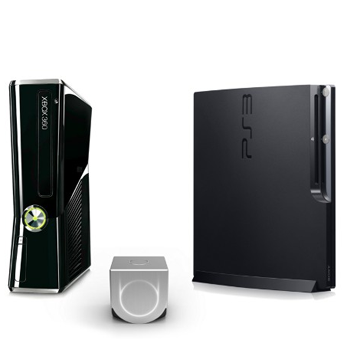SantechUSA
A WORLD WITH GREAT GEAR • 1-888-923-1000

Ouya CEO Julie Uhrman is a happy gamer. Poised to disrupt the big box gaming console market, dominated by heavyweights Microsoft, Nintendo and Sony, the open-source Ouya arrived in stores on June 28 and is moving units on Amazon. The company has already enticed 10,000+ developers to add new titles to its growing roster. According to Uhrman, they're "not the same old games by the same old folks adding +1 to the version number and slapping on a price tag of $60 or more."
As the gaming world's tiny third-party, Android-based console, in the midst of industry titans, it's created a vulnerable buzz. The 2.95" cube, which hooks up to a TV via HDMI, has a legion of fan investors who helped catapult it into Kickstarter glory as the crowd funding website's second most successful project of all time, with $8.5 million in contributions. By combining their tremendous marketing heat with the kind of ethos gamers love – a platform with a customized operating system that's open to all developers, with no discs to buy – Ouya can position itself to redefine the $25+ billion dollar gaming industry, whose lion shares go to Microsoft's Xbox 360, Nintendo's Wii and Sony's PlayStation 3. With 67% of U.S. households home to loyal gamers, as well as a generation of players who have learned how to code, hack and jailbreak, there's room for a low-cost, open-source option.
The Nvidia Shield, a similar, portable Android gaming device with a much bigger price tag, got hit with its own launch delay on June 25. At 5" tall, it costs a whopping $299, leaving the Ouya on its own shelf.
While major retailers picked up the Ouya on June 25, a beta version was available in March. Having gone from concept to console in roughly eight months, the company's first round of reviews dispelled every notion that the new kid on the block would glide onto the scene without a hitch. The reviews were largely lousy.
But there's a mercurial aspect to the gaming community with lots of 30-something-year-old males who not only embrace new worlds, question authority and become loyal players, but also remember every cash-sucking maneuver made on behalf of the titans who have them under lock and key. They may forgive Ouya and give the company plenty of wiggle room and lots of time to straighten out its kinks, attract top developers and free their monopolized legions. If the rate at which the company attracted its backers – one every 5.59 seconds – is any indication of how badly gamers want to bust open the current marketplace, the new kid is good.
But first, Ouya is still bouncing back from the mea culpa it recently issued its investors, many of whom, Uhrman claims, were foreign. Some of those Kickstarter backers didn't get their devices on time, if at all, as pledged. Others said the device was, simply, a loser.
Developers, troubleshooters and marketing genies may change all of that. At last check, the device had sold out on Amazon – a statistic well played, as the company did not reveal how many consoles were actually available in the first place. And so the heat is back on, with developers like Tripwire Interactive, Sega, Square Enix and Double Fine Productions adding titles to the growing library of games. Although the collection feels like an overgrown version of your smartphone's favorite games, it's hard to know where avid developers can take the new device.
So far, Ouya’s key strengths seem to be its look and price. At $99, in a sleek silver case with an Apple-esque aesthetic, the company just needs some breakout hit titles to make the iconoclasts and enthusiasts game enough to buy it.
Copyright © 2017 Santechusa.com, All Rights Reserved.







